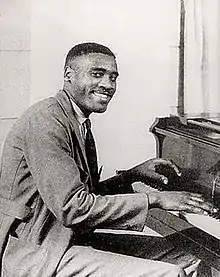Leroy Carr
Leroy Carr (March 27, 1905 – April 29, 1935)[1] was an American blues singer, songwriter and pianist who developed a laid-back, crooning technique and whose popularity and style influenced such artists as Nat King Cole and Ray Charles. He first became famous for "How Long, How Long Blues", his debut recording released by Vocalion Records in 1928.[2][3]
Leroy Carr | |
|---|---|
 | |
| Background information | |
| Born | March 27, 1905 Nashville, Tennessee, United States |
| Died | April 29, 1935 (aged 30) Indianapolis, Indiana, United States |
| Genres | Blues |
| Instruments | Piano |
Life and career
Carr was born in Nashville, Tennessee, United States,[4] and raised in Indianapolis, Indiana. His recording career was cut short by his early death, but he produced a large body of work.[2] Some of his most famous songs include "Blues Before Sunrise" (1932), "Midnight Hour Blues" (1932), and "Hurry Down Sunshine" (1934). He had a longtime partnership with the guitarist Scrapper Blackwell.[3] His light bluesy piano combined with Blackwell's melodic jazz guitar attracted a sophisticated black audience. Carr's vocal style moved blues singing toward an urban sophistication, influencing such singers as T-Bone Walker, Charles Brown, Amos Milburn, Jimmy Witherspoon, and Ray Charles, among others.[5]
Carr was among the most prolific and popular blues artists between 1928 and 1935. He recorded for Vocalion through to when he signed to Victor's Bluebird imprint, where he made his final recordings.
Count Basie and Jimmy Rushing recorded some of Carr's songs, and Basie's band shows the influence of Carr's piano style.[6]
Carr's music has been recorded by a long list of artists, including Robert Johnson, Ray Charles, Big Bill Broonzy, Moon Mullican, Champion Jack Dupree, Lonnie Donegan, Long John Baldry, Memphis Slim, Barrelhouse Chuck and Eric Clapton.
Carr was an alcoholic.[4] He died of nephritis shortly after his thirtieth birthday.[4]
Discography
- Blues Before Sunrise (Columbia, 1962)
- Masters of the Blues, vol. 12 (Collector's Classics, 1971)
- Leroy Carr 1928–34 (K.O.B., 1971)
- Leroy Carr & Scrapper Blackwell: Naptown Blues 1929–1934 (Yazoo, 1973)
- Singin' the Blues 1937 (Biograph, 1973)
- Leroy Carr, vol. 2 (Collector's Classics, 197?)
- Don't Cry When I'm Gone (The Piano Blues, vol. 7) (Magpie, 1978)
- Leroy Carr 1928 (Matchbox, 1983)
- Leroy Carr & Scrapper Blackwell: Great Piano-Guitar Duets (1929–1935) (Old Tramp, 1987)
- Leroy Carr 1929–1934 (Document, 1988)
- Leroy Carr & Scrapper Blackwell 1929–1935 (Best of Blues, 1989)
- Leroy Carr & Scrapper Blackwell 1930–1958 (RST, 1989)
- Naptown Blues (Aldabra, 1992)
- Leroy Carr, vols. 1–6 (Document, 1992)
- Leroy Carr, vols. 1–2 (The Piano Blues series) (Magpie, 1992)
- Southbound Blues (Drive, 1994)
- Hurry Down Sunshine (Indigo, 1995)
- Naptown Blues (Orbis, 1996)
- Leroy Carr & Scrapper Blackwell: How Long Blues 1928–1935 (Blues Collection, 1997)
- American Blues Legend (Charly, 1998)
- Sloppy Drunk (Catfish, 1998)
- Prison Bound Blues (Snapper, 2001)
- P-Vine Presents 21 Blues Giants: Leroy Carr (P-Vine, 2001)
- The Essential Leroy Carr (Document, 2002)
- Whiskey Is My Habit, Women Is All I Crave (Columbia, 2004)
- Leroy Carr & Scrapper Blackwell: The Early Recordings of an Innovative Blues Master, vol. 1, 1928–1934 (JSP, 2008)
- How Long How Long Blues (Wolf, 2008)
- When the Sun Goes Down 1934–1941 (JSP, 2011)
References
- O'Neal, Jim. "Leroy Carr: Biography". AllMusic.com. Retrieved 2015-08-30.
- Russell, Tony (1997). The Blues: From Robert Johnson to Robert Cray. Dubai: Carlton Books. pp. 52–53. ISBN 1-85868-255-X.
- Giles Oakley (1997). The Devil's Music. Da Capo Press. p. 160. ISBN 978-0-306-80743-5.
- Colin Larkin, ed. (1997). The Virgin Encyclopedia of Popular Music (Concise ed.). Virgin Books. p. 230. ISBN 1-85227-745-9.
- Shaw, Arnold (1978). Honkers and Shouters. New York: Macmillan. pp. 8–9. ISBN 0-02-061740-2.
- Keil, Charles (1991). Urban Blues. Chicago: University of Chicago Press. pp. 65–67, 107. ISBN 0-226-42960-1.
Bibliography
- Wald, Elijah (2004). Escaping the Delta: Robert Johnson and the Invention of the Blues. HarperCollins. ISBN 0-06-052423-5.